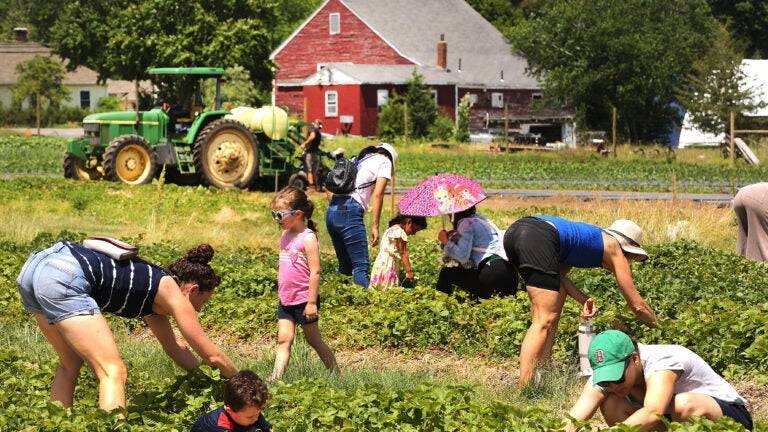Sign up for the Today newsletter
Get everything you need to know to start your day, delivered right to your inbox every morning.

By Annie Jonas
For many millennials, a trip to a pick-your-own (U-pick) farm isn’t about stocking up on fresh fruit anymore — it’s about the vibe, Portland Press Herald staff writer Leslie Bridgers wrote in a recent column.
But behind the Instagrammable scenes of berry picking lies a quieter struggle: U-pick farms are finding themselves overwhelmed, not by a lack of customers, but by the wrong kind of customer.
When Bridgers – a self-proclaimed millennial – found herself at a U-pick farm in Gorham, Maine recently, she couldn’t help but confess the real reasons for being there: “Because I’m a millennial woman is why, insatiable for seasonal activities and all their trappings — the outfits, the beverages and, of course, the photographic documentation,” she wrote.
This summer, some longtime U-pick operations began quietly closing their gates to the public — not because business was slow, but because the fruit-hungry crowds of the past have been replaced by photo-happy tourists and casual weekenders who leave with more photos than produce. In short: the effort required to host these visitors isn’t always worth the revenue they generate.
“We’re starting to see some (farmers) ditch U-pick because it’s not worth it,” David Handley, a vegetable and small fruit specialist at the University of Maine, told the Press Herald. “They’re running around and putting out fires … managing more and more people, but selling the same amount of products.”
Visitors come expecting not just fresh fruit, but curated experiences — and they bring kids, strollers, and a long list of needs, too, Bridgers lamented. For small farms with limited staff, it’s become unsustainable.
“We wannabe farmers-for-a-day have taken a toll on U-pick operations, demanding bathrooms, food and other forms of entertainment, forcing actual farmers into becoming amusement park operators,” Bridgers wrote.
To be fair, millennials didn’t invent the seasonal aesthetic, she makes clear. But the generation’s appetite for curated, shareable experiences — paired with the power of social media — has transformed how people engage with U-pick farms.
Still, not everyone sees the shift as a death knell. For some farms, the influx of millennials has brought a much-needed boost in visibility — and creativity.
“You keep your finger on the pulse of what people want, because ultimately, that’s who you’re working for,” Charlie Rackley, a co-owner at Fairwinds Farms, told the Press Herald. “Whether they want more of an experience or just a bunch of berries to pick, you have to be willing to adapt.”
But even those who’ve adapted acknowledge the trade-offs. The core of U-pick — the idea of gathering fresh, local fruit for your family — is changing. Fewer people are filling buckets. More are filling camera rolls.
So, are millennials really “killing” U-pick farms? Maybe not. But they’re certainly reshaping them — one carefully posed photo at a time.
Tell us your thoughts by filling out the form or e-mailing us at [email protected], and your response may appear in a future Boston.com article.

Annie Jonas is a Community writer at Boston.com. She was previously a local editor at Patch and a freelancer at the Financial Times.
Get everything you need to know to start your day, delivered right to your inbox every morning.
Stay up to date with everything Boston. Receive the latest news and breaking updates, straight from our newsroom to your inbox.
Conversation
This discussion has ended. Please join elsewhere on Boston.com